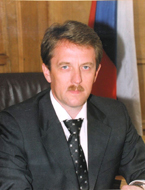WTO is eager to accept Russia?
 Every year Russian exporters have 2.5 billion dollar losses because of restrictions other countries (including the EU members) apply to them, Said Russian Deputy Prime Minister, Minister of Agriculture Alexei Gordeev.
Every year Russian exporters have 2.5 billion dollar losses because of restrictions other countries (including the EU members) apply to them, Said Russian Deputy Prime Minister, Minister of Agriculture Alexei Gordeev.
"Such huge losses are caused by about 90 restricting measures applied to Russian goods”, Gordeev said at “East-West” XI International Agriculture Forum in Berlin on January 17, RIA-Novosti information agency reports. The Forum is conducted as a part of International Fair Exhibition “Green Week”, and the Russian Minister was speaking on the issue of “Global trade – prospects for the extended European Union and its new neighbors”.
According to Gordeev, for the 11 months of 2003 importing food and products for producing food to Russia grew 11 percent and reached the level of 9.9 billion US dollars. For the same period of time, Russian exporting food and agriculture products grew 23 percent in comparison with 2002 and had the volume of 2.4 billion US dollars, the Minister said.
Gordeev reminded the fact that in 2003 Russia set quotas for importing beef, pork and poultry. “The quotas resulted from increasing import of such products subsidized by the countries-exporters, to Russia”, he said. According to Gordeev, “this import influenced negatively the price of the same product of local manufacturers and suppressed Russia’s domestic food industry”. “Of course these are forced measures, and we are working on improving the mechanisms of regulation agricultural trade”, the Deputy Prime Minister said.
He believes that expanding the EU will make a negative impact to the number of positions of the Russian export, and first of all to the Russian exporters of agricultural products, RIA-Novosti information agency reports.
Russia considers the EU expanding as the natural and objective process, said Gordeev. “The tempo and conditions of this expanding are set by the interested parties – the European Union and the states intending to join it”.
"Not the process of the EU expanding itself is under our scrutiny, but its consequences for Russia and its traditional relations with the countries joining the EU”, the Minister said. “We are concerned about the future of export to the countries joining the EU after May 1 because new quotas may start being applied”.
Meanwhile, the EU countries believe that Russia soon is going to agree with the “reasonable arguments” of the leaders of global trade and will join WTO. According to the Minister on Protection of Consumers, Food and Agriculture of Germany Renata Kyunast’s statement at “East-West” Agricultural Forum, Russia can may join WTO at the end of 2004 or in 2005.
According to Kyunast, "By telling about its intention to join WTO, Russia demonstrated that it is a part of the overall global trade system".
"Accepting Russia in WTO is a complicated procedure, but it has already been shaped”, said Euro Commission member Frank Fisher at the Forum. According to him, “Russia is required to do much work on adjusting its domestic laws to the WTO requests”.
According to Fisher, the negotiations "had certain success on the issues of agriculture". "In particular, we agreed with the Russia’s quoting import of meat, the issue of the level of state subsidies to agriculture is being solved”.
Russia’s joining WTO is supported by the USA, said the US representative at the Forum, speaking on behalf of the Minister of Trade Robert Zellic.
Progress has been made at the negotiations on Russia’s joining WTO. The partners coordinated about 85 percent of the tariff positions, Alexei Gordeev said. The negotiations have been finished with the number of countries, and are in the final stage with others. On the whole, Russia entered the negotiations final stage on coordinating the most complicated and problematic issues, Dni.ru online newspaper reports.
However, this does not mean that there are no contradictions on these issues. A Russian official – the member of the government delegation threatened his EU counterparts with the prospect of introducing high duty on food imported from the EU countries. In particular, high duty may be applied to the well-known European cheese brands.
Source: Internet-media and Pravda.ru

Subscribe to Pravda.Ru Telegram channel, Facebook, RSS!


